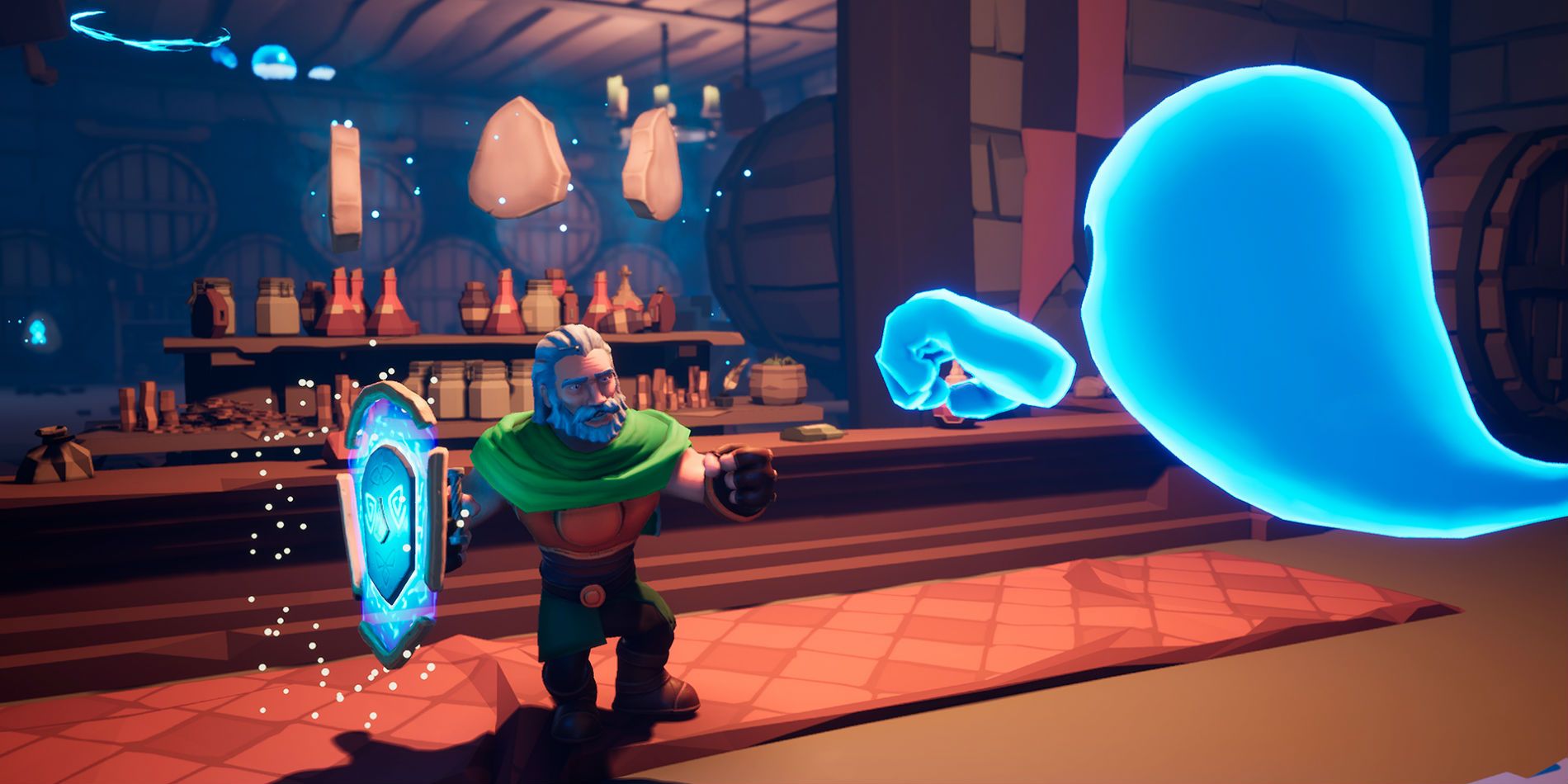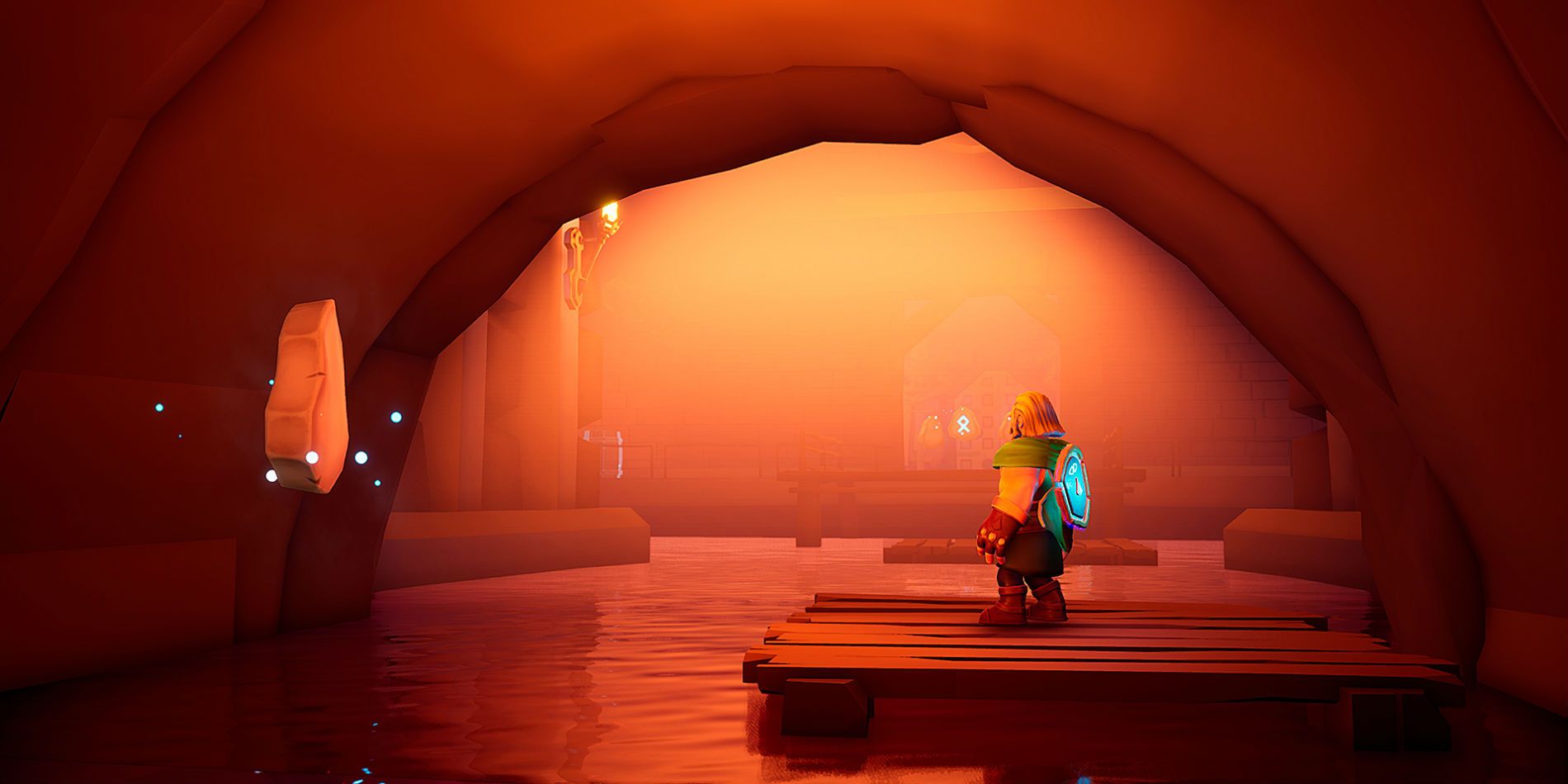Nostalgia is a powerful thing, especially in video games. Given how much the industry cares about having the newest, most powerful tech or getting in on the very most recent trend, it can be surprising to see how many games hearken back to the early games, the ones that defined peoples' childhoods. Effie is nothing if not a nostalgia engine. It wears its inspirations proudly on its sleeve, taking influences from classic 3D platformers like Ratchet & Clank and Jak & Daxter. The love the developers had for those milestones is matched inch for inch by their love for Effie, and even if the game falls quite a bit short of living up to its heroes, the heart and creativity put into it makes it a hard game to really dislike.
Effie puts the player in the shoes of a young man named Galand, who is turned old by an evil witch. In order to undo the curse he must cleanse the three Gems of Evil and then defeat the witch herself. It's a bit of a tired premise, another of the many fantasy games that task the player with hunting down a handful of magical crystals. The conceit of the game is that it is all in the form of a story being told by Galand to the title character, a young girl named Effie. This storytelling style has a clear influence on the gameplay; as you adventure through the game, Galand is constantly narrating everything that happens to Effie. This is a quaint idea that sets up some cute moments; for instance, whenever the player respawns after death, the narrator will usually be inclined to cover up for whatever error led to their demise, claiming that it didn't actually happening or blaming their fumble on Galand's magically-induced age. Unfortunately, the charm wears off quick, and the player will swiftly grow tired of the narrator cryptically proclaiming that "Galand felt an urge within him" after they open a chest.
The meat of the gameplay is just what you'd expect; platforming, exploration, and combat. The main draw of the gameplay is the protagonist's signature tool; a magical shield called Runestone. This is the only weapon Galand wields, but that's far from a bad thing. It has a variety of uses, and as you progress through the game, more special abilities are added to Runestone's arsenal. Some help with traversal, like a special dash that proves invaluable throughout the game's platforming challenges, while others, like the ability to fling your shield in a circle around you and strike all enemies in range, are simply powerful combat tools.
Combat in Effie is only okay. At the start of the game you can perform a light attack with your shield or a heavy one, and you can of course also block. Blocking with your shield doesn't work the way you expect; it produces an invulnerable dome of magic around Galand's body that protects him from harm at the cost of some of his energy every time it is hit. Galand is immobile as long as he has the shield up. Beating enemies with the shield is satisfying enough, but combat is ultimately clunky, and too shallow for its own good. Even as you gain access to powerful special moves, you're never really called to strategize in any meaningful way. Your energy pool never seems to decrease fast enough for it to be a real concern, even when you get the strongest attacks. This means that by the end of the game there's not really anything stopping you from just obliterating everything in your path. The enemies aren't particularly varied, either; by the time you get about halfway through the game you've already fought everything the game will ever throw at you. There are a couple of large monsters that are impervious to your light attacks, but this is as challenging as the game tries to get. There are no weak points to exploit, no attack patterns to memorize. The combat system isn't bad, per se, it just feels needless. The potential offered by Galand's magical shield is never fully realized.
The stronger aspect of the gameplay in Effie is its platforming. It's not phenomenal, but it's certainly not bad. The controls are responsive enough, and challenging without being frustrating. Effie is far from a hard game, but it's not a cakewalk either. The game relies heavily on things like bottomless pits and pools of lava to raise the stakes in platforming challenges, but death is forgiving, and points where the game autosaves are relatively plentiful. The player is deposited at one of these with nothing but a repetitive remark from the narrator to punish them for them for their failure. In addition to platforming gauntlets and combat challenges, Effie also offers a few puzzles to tease the player's brain. These puzzles are, for the most part, incredibly easy, but they can still amuse for the few seconds it takes the player to figure them out. Given how brief and unobtrusive they are, it'd be hard to say anything bad about them, especially because the ideas behind some of them are pretty creative. Still, the game would lose little in the way of challenge if they were removed.
If there's one thing Effie truly excels at it's the environments. The cities that Galand must journey to look gimmicky from a distance, and that's no coincidence; they are gimmicky. Each city is themed after a singular defining trait, like windmills, lumber, or even grape juice. While that might feel like lazy worldbuilding, the beauty of Effie's world isn't in the overarching lore, but in the details. The environments of each city are beautifully detailed, filled with little touches that make the cities feel like actual places, not just backdrops for floating platforms to jump on. It's always a delight to turn a corner or open a door and see what delightful new setting you'll get to explore next. This creativity translates to gameplay, too; there are plenty of unique challenges offered by the setting, like a river of grape juice in Vineyard City that Galand must cross by jumping across barrels. Unfortunately, the magic of Effie's level design does not extend to its overworld. The cities are placed in the red plains of Oblena, a realm that is as pretty as it is empty. A few small distractions are scattered around for the player to amuse themselves with if they so choose but if one were to just hop on one's shield and magically surf their way to the next city, they wouldn't miss much.
Ultimately the plight of Effie's protagonist is a rather fitting metaphor for the game as a whole. It's a new title, originally released for PS4 about half a year ago and only now seeing a PC release. But its reliance on the past instantly makes it seem older than it is. And, like a young man suddenly cursed with old age, it can get stiff and clumsy from time to time. But just like its jolly old protagonist, who never stops smiling and who flashes a thumbs-up at the concept of grape juice, Effie has charm for days. It's a flawed game, certainly. It's very short, beatable in only three to five hours, and there was little variety in terms of gameplay and combat. Ultimately it felt more like a generous demo than a full game. But it has heart. And if that's something you're looking for, you could do a lot worse than pick up Effie.
Effie is available for PlayStation 4 and releases on Steam on January 28. A Steam code was provided to Screen Rant for the purpose of this review.



